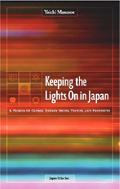| Keeping the Lights On in Japan | ||||||
|
||||||
| Japan relies heavily on imports for energy resources. Stability in the international community is a prerequisite to acquiring the energy the nation needs. Especially in the case of oil- the lifeline ofthe Japanese economy-securing access to supplies is of great import in Tokyo's foreign policy. Active participation in realizing peace in the Middle East and reconstructing Afghanistan is, accordingly, an integral element of our country's diplomatic strategy. The two oil crises ofthe 1970s were triggered by developments on the supply side, but ifa third oil crisis arrives, it may well be precipitated by demand-side factors. Asian countries, China in particular, are devouring oil in increasing quantities for their economic development, and their voracious appetite for it could cause the price, ofcrude oil to surge. As one ofthe world's leaders in energy conservation, Japan needs to make its excellent technologies widely available to its Asian neighbors and promote efficient energy use. Humankind has now encountered environmental problems ofglobal proportions. People everywhere must strive to conserve the environment, employ the earth's resources wisely, and protect the air and water from pollution. Along with the countries of Europe, Japan is actively involved in the international battle against global warming. It must be observed, however, that the United States and many developing countries are not equally COmmitted to this endeavor. Targets for curbing greenhouse gases have been established for the industrial nations under the Kyoto Protocol, and Japan is fully determined to reach the target set for it. Nuclear power delivers as much as onelhird ofJapan's electricity supplies and has become an indispensable part of the country's energy Strategy. Over the years to come, we need to direct efforts at ensuring the safety ofnuclear power, completing the development offast breeder reactors, and coming up with technology for the realiz1ation of nuclear filsion. In this book I present an essay on Japan's energy strategy,considering the topic from a variety of perspectives. As a member ofthe House of Councillors in Japan's National Diet, I am currently endeavoring to get the proposals presented in the book reflected in government policy. My hope is that the English edition will help readers overseas gain an underv standing ofJapan's energy policies and the place ofenergy in the everyday life of the Japanese. |
||||||
